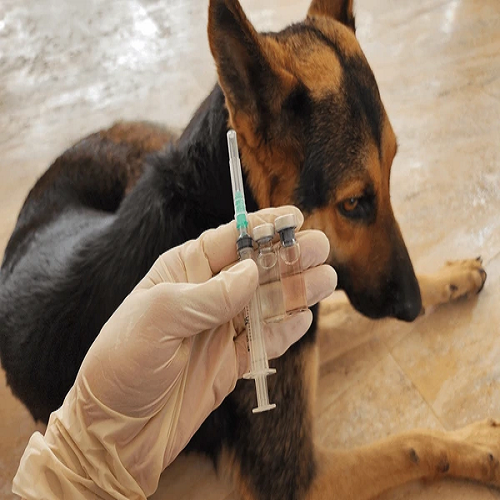Understanding Canine Distemper for Dog: Causes, Symptoms, and Prevention
Canine distemper is a highly contagious and serious viral disease that affects dogs, as well as certain wildlife like raccoons and ferrets. It is caused by the canine distemper virus (CDV), which belongs to the same family as the viruses responsible for measles in humans and rinderpest in cattle. Distemper can be fatal, especially in puppies and dogs with weak immune systems, but it is preventable through vaccination. Here’s everything you need to know about this dangerous disease, its symptoms, causes, and prevention.
What is Canine Distemper?
Distemper is a viral illness that attacks a dog’s respiratory, gastrointestinal, and nervous systems. The virus is typically spread through direct contact with an infected animal or airborne respiratory secretions exposure. Once inside the dog’s body, the virus replicates and begins to wreak havoc on multiple organs and tissues.
How is Canine Distemper Spread?
Distemper is extremely contagious and can be spread in several ways:
1. Direct Contact: Dogs can contract the virus through close contact with an infected dog or wildlife. This includes exposure to bodily fluids like saliva, urine, or blood.
2. Airborne Transmission: The virus can also spread through airborne droplets, such as when an infected dog sneezes or coughs.
3. Contaminated Objects: Items like food bowls, water dishes, bedding, and toys that have been contaminated with the virus can also facilitate its spread.
Symptoms of Canine Distemper
The symptoms of canine distemper can vary depending on the stage of the disease and which systems in the body are affected. Initially, dogs may show mild signs before the condition worsens. Below are the key symptoms of distemper:
1. Early Signs (Mild Stage):
– High fever
– Lethargy
– Nasal discharge
– Eye discharge
– Loss of appetite
– Coughing
2. Gastrointestinal Symptoms:
– Vomiting
– Diarrhea
– Dehydration
3. Respiratory Symptoms:
– Coughing
– Labored breathing
– Pneumonia
4. Neurological Symptoms:
– Seizures
– Muscle twitching
– Circling behavior
– Partial or complete paralysis
– Head tilt
– Loss of balance
5. Hardening of Nose and Paw Pads (Hyperkeratosis):
– In some cases, the virus causes the hardening of the skin on the nose and paw pads, leading to cracking and discomfort.
Causes of Canine Distemper
The primary cause of canine distemper is exposure to the canine distemper virus (CDV). The virus targets several organ systems and can remain active in the dog’s body for weeks. Puppies, especially those who have not been vaccinated, are at the highest risk of contracting the virus. Other factors that increase susceptibility include:
– Weak immune systems
– Lack of vaccination
– Close contact with infected animals (wildlife or domestic)
– Environments with poor hygiene or overcrowded conditions (such as shelters or kennels)
Treatment for Canine Distemper
Unfortunately, there is no cure for canine distemper, and treatment primarily focuses on managing symptoms and supporting the dog’s immune system. Veterinarians may recommend the following treatments:
– Fluid Therapy: To prevent dehydration due to vomiting or diarrhea.
– Antibiotics: Although antibiotics don’t treat viruses, they can be used to prevent or treat secondary bacterial infections that often arise due to weakened immunity.
– Anticonvulsants: These may be prescribed to manage seizures or neurological symptoms.
– Nutritional Support: High-quality nutrition and immune-boosting supplements may help the dog recover.
Prevention of Canine Distemper
Puppies should receive a series of distemper vaccines starting at 6-8 weeks of age, followed by booster shots throughout their life. Key preventive measures include:
1. Vaccination: Make sure your dog is up to date on their distemper vaccines, which are usually given in combination with other core vaccines.
2. Avoid Contact with Sick Animals: Keep your dog away from wildlife or other dogs that may be infected.
3. Maintain Good Hygiene: Clean your dog’s living space, food bowls, and toys regularly.
4. Regular Veterinary Check-ups: Routine vet visits can help ensure your dog’s immune system remains healthy, and early signs of any illness can be detected.
Conclusion
Canine distemper is a dangerous and life-threatening disease that can cause severe harm to a dog’s respiratory, gastrointestinal, and nervous systems. Recognizing the symptoms early and seeking veterinary care can improve the chances of recovery, though prevention through vaccination is the most reliable defense. If you suspect your dog has been exposed to the virus, contact your veterinarian immediately to minimize potential complications. With proper care and vaccination, distemper can be avoided, giving your dog a longer, healthier life.




